Share
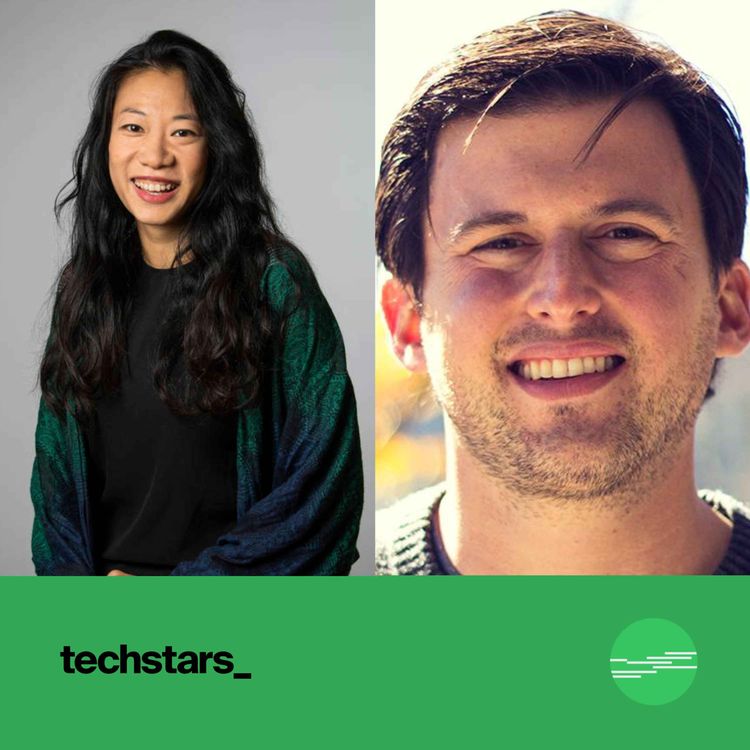
Techstars Climate Tech Podcast
How To Start and Grow a Renewable Energy Company, with Steph Speirs and Yoav Lurie
Renewable energy startups — and the entrepreneurs who found them — are crucial to the fight against climate change. These founders are smart, driven, and agile enough to see the opportunities in energy right now, and dive in. This is a fascinating time in energy, as renewable sources become cheaper and easier to democratize, reaching a more racially and economically diverse set of users, and big utility companies are also starting to see the need to get on board with sustainable initiatives.
It wasn’t long ago that climate tech was unpopular. We’re grateful to see that changing. But here are some words of wisdom from Yoav to other entrepreneurs who are doing the right thing, even when no one else believes in their mission: “Don't be afraid to do the unpopular thing, because the rest of the world is just going to catch up.”
Listen to learn about community solar, energy savings at home, learning to work with utility companies, the importance of infrastructure, and more.
Follow Solstice on Twitter @solarforgood
Follow Yoav on Twitter @yoavlurie
Techstars personnel and/or guests who speak in this podcast express their own opinions, and not the opinion of either Techstars or any company discussed in this podcast. This podcast is for informational purposes only, and should not be relied upon as legal, business, investment, or tax advice. You should consult your own advisers as to those matters. References to any securities are for illustrative and/or informational purposes only and do not constitute an investment recommendation or offer to provide investment advisory services. Furthermore, this content is not directed at nor intended for use by any investor or prospective investor, and may not under any circumstances be relied upon when making a decision to invest in any fund managed by Techstars. Certain of Techstars funds own (or may own in the future) securities in some of the companies discussed in this podcast.
More episodes
View all episodes
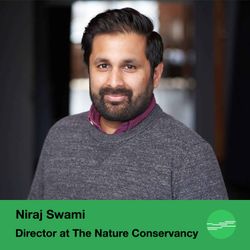
6. Niraj Swami / The Intersection of AI, Healthcare, and Climate
27:53||Season 2, Ep. 6They might seem like two different worlds, but the reality is, there is a close relationship between health and climate. Once we peel back some of the layers, the similarities are ever-present.In this episode, Cody chats with Adaptrack CEO Niraj Swami, who is also part of the Nature Conservancy with Conservation Technology Strategy & Enablement, about the intersection of health and climate, and how they have parallel models with a common customer — humans.“What excited me about climate data was that the planet doesn't lie. You ask somebody how they feel, they’ll tell you no good, so-so, but when you ask the planet how it feels, it gives you a number. That's good stuff for AI, the numbers are good things for AI.”Cody and Niraj also talk about AI’s ability to empower scientists so they could accelerate their climate-related work through smart solutions and decision-making support, and the potential collaboration of space tech and climate tech. Don’t miss the pair discussing the mitigation aspect of AI and predicting outcomes in a much more measured and confident fashion.Follow Niraj on Twitter @nswamiFollow Cody on Twitter @codysimmsListen & subscribe to The Techstars Climate Tech Podcast on Apple Podcasts, Spotify, and more.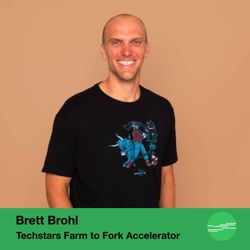
5. Brett Brohl, Managing Director of Techstars Farm to Fork Accelerator
31:55||Season 2, Ep. 5Everybody’s got to eat. That’s the mantra of the Techstars Farm to Fork Accelerator and the Bread and Butter Ventures. Managing Director Brett Brohl is passionate about food: cooking it, eating it, and investing in the next group of startups in this area, which has only gained popularity in the past two years despite being a huge market and full of opportunities. “What are the natural spaces to go to when you talk about impact and sustainability? Well, it’s food, because the food system has such an impact on the planet.”In this episode, Cody chats with Brett about the accelerator and VC company, which invest in tech-enabled hardware and software from biotech on farms all the way to the future of food retail. They also discuss what Brett calls “the messy middle”: logistics, transportation, automation, and manufacturing that get produced food out to the world in a sustainable way.Cody and Brett also talked about regional commodities versus global commodities, plant-based and cell-based proteins with the goal of reducing greenhouse gas emissions, and how food waste plays a huge role in the climate impact. Follow Brett on Twitter @BrettBrohl & on YouTube Brett’s BrainFollow Cody on Twitter @codysimmsListen & subscribe to The Techstars Climate Tech Podcast on Apple Podcasts, Spotify, and more.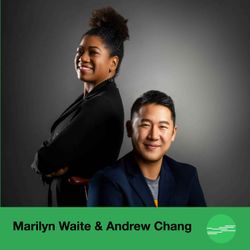
4. Andrew Chang and Marilyn Waite / Recognizing China as the Real Battlefront Against Climate Change
36:29||Season 2, Ep. 4China will reach peak carbon emissions in 2030, and expects to be carbon-neutral by 2060. One-quarter of the world’s emissions are from China, but without China, there is no solving climate change.In 2020 alone, China outperformed the U.S. in wind and solar, including high-emitting and hard-to-abate sectors. By leveraging AI, carbon capture, big data and more, climate tech startups in China are giving the world hope for significant decarbonization. Opportunities for investment are plentiful, gateways to access funding are open, and pilot projects are in development like never before.Listen to Marilyn and Andrews' China Cleantech Podcast and subscribe to their newsletterFollow Cody on Twitter @codysimmsListen & subscribe to The Techstars Climate Tech Podcast on Apple Podcasts, Spotify, and more.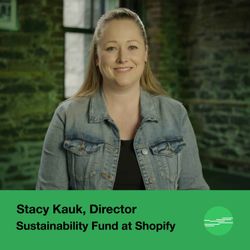
3. Stacy Kauk / Democratizing Sustainability to Build Accessibility for Carbon Removal Technologies
39:20||Season 2, Ep. 3About two years ago, Shopify was looking to go the extra mile on its environmental footprint by purchasing carbon credits or offsets. Through discovery, the company realized how limited the market was for this type of sustainability method and how it needed growth.In this episode, Cody chats with Stacy Kauk, Shopify’s director of Sustainability Fund, which makes an annual commitment of $5 million toward entrepreneurial breakthrough technologies and companies to advance sustainability. Stacy shares how the fund tries to identify and support those solutions that all of humanity is going to need in the long run (“We’re playing the long game.”), and gives us insights into what exactly is emission reduction versus carbon removal.Cody and Stacy also discuss how climate change is a real threat to entrepreneurship, how they are trying to kickstart the market and democratize sustainability, and how buyers can find these products to help their carbon offset.Follow Cody on Twitter @codysimmsCheck out the Shopify Sustainability Fund here: https://www.shopify.com/about/environment/sustainability-fundListen & subscribe to The Techstars Climate Tech Podcast on Apple Podcasts, Spotify, and more.
2. Derek Handley / Investing in the Next Sustainable Startup for a Competitive Marketplace
33:58||Season 2, Ep. 2At the dawn of mobile, Derek Handley wanted to be an innovator, building a global company. About a decade ago, he had an existential crisis: What would happen if his business, his identity all went away? From this, Derek moved fully into sustainability and founded Aera VC to pick up where the climate pioneers left off. Now, Aera VC is investing in sustainability leaders that are tackling carbon in chemicals, reduction of industrial reliance on fossil fuels, the struggle for a plastics replacement, and how concrete is negatively affecting global emissions despite it being a more climate change champion.Cody and Derek also discuss the industrial revolution and how though it changed the world for the positive, the early warning signs of the fossil fuels’ destructive nature didn’t come to the forefront for a very long time. Connect with our guest:Derek Handley, Aera VC: https://www.aera.vc/team-member/derek-handley/Aera VC LinkedIn: https://www.linkedin.com/company/aera-vcFollow Cody on Twitter @codysimms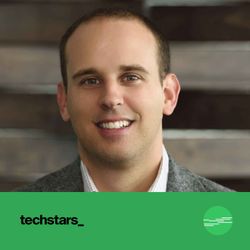
1. Justin Field / Enhancing Government Policy and Funding for Climate Technology Startups
37:19||Season 2, Ep. 1Until recently, startups and VCs in the climate technology space haven’t had a lot of resources or reach. Government has been particularly hostile toward innovative startups, crippling funding and opportunities -- but the NVCA (National Venture Capital Association) is working with the federal government to change that. A record amount of capital is streaming in, bills are passing robustly, and the NVCA is committed to making sure the best technologies win big and do well. This unified front promises to organize and coordinate voices so entrepreneurs in fields like carbon capture can feel more confident, impactful and profitable. Connect with our guest:Justin Field, NCVA: https://nvca.org/about-us/staff/justin-field/NCVA on social: https://twitter.com/nvca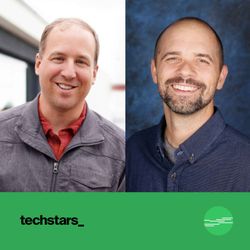
Sustainability and economic opportunity with David Cohen and Cody Simms
28:16|People want their capital to be used for good, and whether it’s clean energy or sustainable agriculture, there is ample economic opportunity in efforts to decarbonize the planet. In this special podcast crossover episode, Techstars’ own David Cohen and Cody Simms discuss how the entrepreneurial ecosystem is rallying around climate change. Also, stay tuned for Season 2 of Techstars Climate Tech podcast, coming this fall!
7. Environmental Justice and Climate Change, with Tenzin Seldon
26:16||Season 1, Ep. 7Today, about 1% of the world’s land mass is an “extremely inhospitable zone,” like the Sahara desert. Over the next 50 years, with climate change, that could expand to 20% of our planet’s surface, with far-reaching effects, including mass migration. Tenzin Seldon, Cofounder and Chief Executive at The Plant, estimates that hundreds of millions of people — even up to a billion people — will become climate refugees over the next 40 to 50 years. Listen for Tenzin’s take on why climate change is a civil rights issue, the human cost of climate change, and how entrepreneurs and startups can best get involved. Engineers and software developers, she’s looking at you to help people spread and scale the great solutions they’re already producing for their communities around the world. And listen for inspiring stories of people who are making a difference. Because while this problem is enormous, Tenzin believes we can find solutions. Techstars personnel and/or guests who speak in this podcast express their own opinions, and not the opinion of either Techstars or any company discussed in this podcast. This podcast is for informational purposes only, and should not be relied upon as legal, business, investment, or tax advice. You should consult your own advisers as to those matters. References to any securities are for illustrative and/or informational purposes only and do not constitute an investment recommendation or offer to provide investment advisory services. Furthermore, this content is not directed at nor intended for use by any investor or prospective investor, and may not under any circumstances be relied upon when making a decision to invest in any fund managed by Techstars. Certain of Techstars funds own (or may own in the future) securities in some of the companies discussed in this podcast.